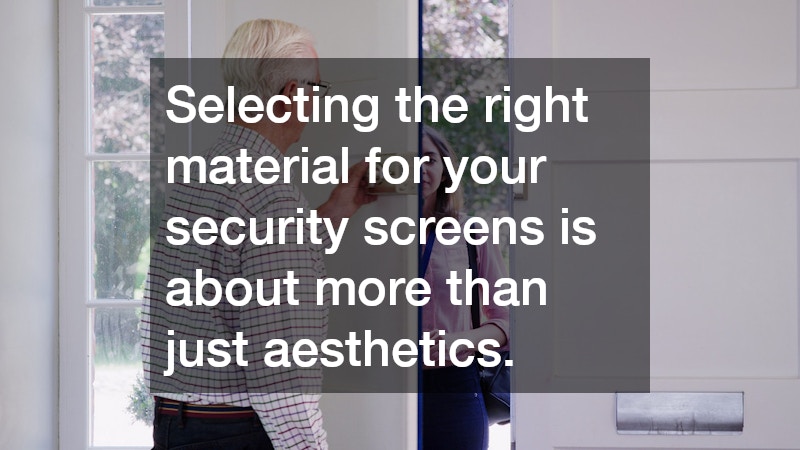When it comes to protecting your home or business, security screens are a smart investment. From deterring intruders to improving airflow and keeping pests out, these screens serve multiple purposes.
But not all screens are created equal, and choosing the right material can make a big difference in terms of strength, style and longevity.
Why Material Matters
The material of your security screens affects everything from durability to visibility. Whether you live in a coastal area, a rural property or a city apartment, selecting the right screen type can enhance both your protection and comfort.
Some materials are better suited to certain environments or security concerns. Others may be more affordable or offer better aesthetic appeal. By understanding your options, you can make a decision that works with your space, your needs and your budget.
Stainless Steel Mesh
One of the most popular options for modern security screens is stainless steel mesh. Known for its strength and resistance to corrosion, this material offers a high level of protection without compromising visibility. It’s ideal for homes that need strong deterrents without looking like a fortress.
Stainless steel is particularly well-suited to harsh Australian climates, including coastal regions where salt air can lead to corrosion in cheaper materials. It requires minimal maintenance and blends easily with most exterior designs. While it can be more expensive than other options, the long-term performance makes it a worthwhile choice for many homeowners.
Aluminium Screens
Aluminium is another common material used in security screens, especially in sliding doors and windows. While not as strong as stainless steel, aluminium screens are lightweight, rust-resistant and available in a range of styles and finishes.
This option is often favoured for budget-conscious renovations or low-risk properties where visual appeal is a higher priority than top-tier security. Modern aluminium screens can still meet Australian standards for security when fitted with reinforced frames and locking systems, making them a good middle-ground choice.
Perforated Aluminium
A growing number of households are opting for perforated aluminium screens. These offer a more solid look while still allowing airflow and visibility. Perforated screens can provide an added sense of privacy compared to woven mesh and are less prone to bending or tearing.
This material balances strength with simplicity. It doesn’t feel industrial or heavy and fits well with modern and minimalist designs. It’s also easy to clean and durable in both hot and wet climates.
Galvanised Steel
Galvanised steel is an option for those who want serious strength at a lower cost than stainless steel. It has a protective zinc coating that guards against rust, although it may still require maintenance over time, especially in humid areas.
This material can handle impact better than aluminium and is less prone to warping. However, it’s heavier and may not offer the same sleek appearance that stainless or perforated aluminium screens provide. Galvanised steel is often used in commercial or industrial settings, but can also be adapted for residential use with the right finish.
Choosing Based on Lifestyle
The way you use your home can influence your choice of security screens. If you have pets or young children, you’ll want something that can withstand scratching and bumps. If you enjoy entertaining or leaving doors open for a breeze, airflow and visibility become more important.
It’s also worth thinking about whether you want a screen that enhances the look of your home or one that’s purely functional. Today’s screens come in a wide range of colours and designs, so you don’t have to sacrifice style for safety.
Professional Advice Goes a Long Way
While it’s helpful to understand the basics, a licensed installer can assess your property and recommend the best materials for your situation. Factors like frame compatibility, door type and local climate all play a part in the final result.
Many reputable suppliers offer customised solutions, allowing you to choose both the material and design that work best for your space. Getting it done professionally also ensures the screens meet safety standards and are fitted securely to avoid future issues.
Selecting the right material for your security screens is about more than just aesthetics. It’s a decision that affects your safety, comfort and the overall value of your property. Whether you’re looking for corrosion resistance, durability or design flexibility, there’s a solution that fits.
By understanding the strengths and weaknesses of each material, you can make a choice that suits your lifestyle and location. Investing in the right security screens today means greater peace of mind and better performance in the years to come.




